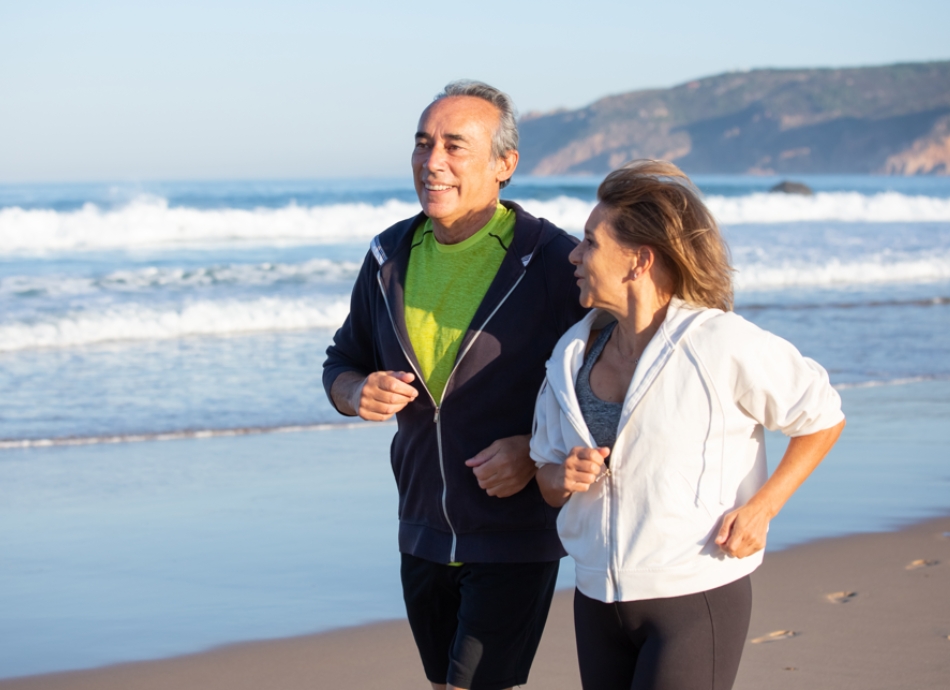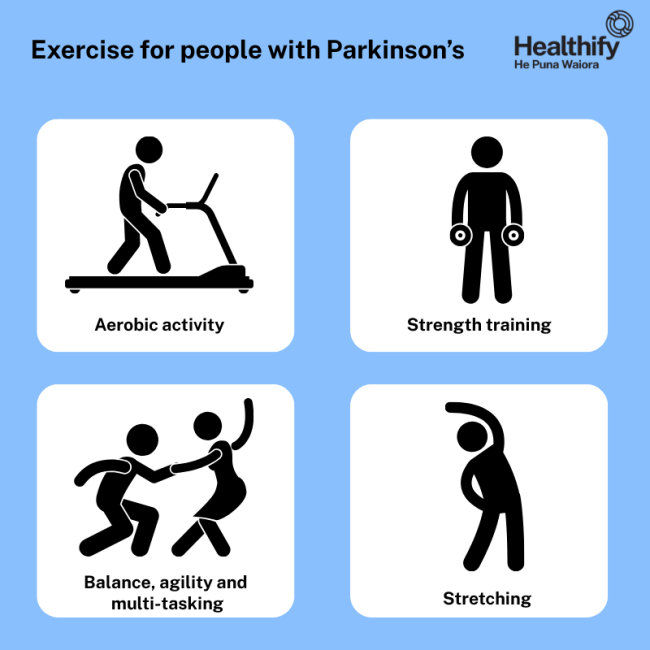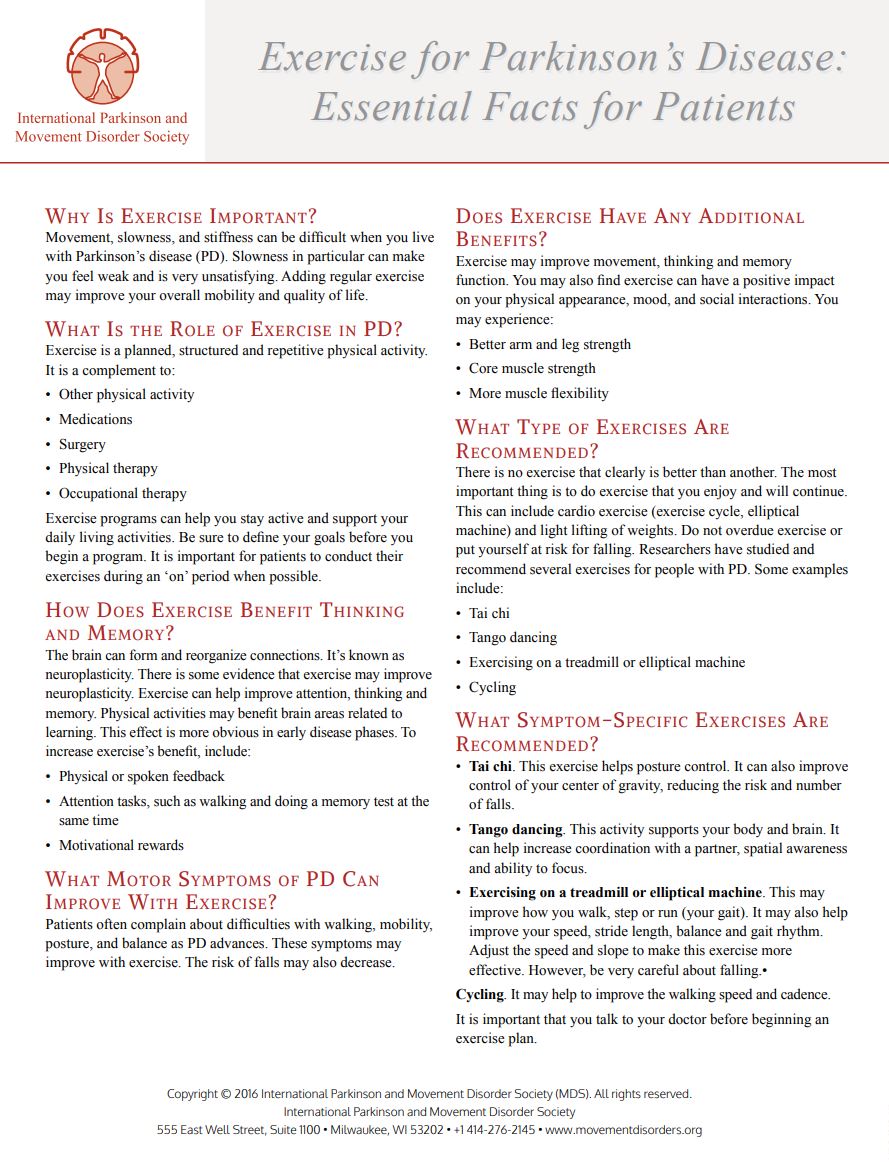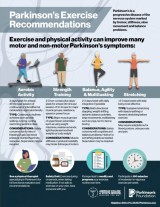If you're a frequent visitor to Healthify, why not share our site with a friend? Don't forget you can also browse Healthify without using your phone data.
Parkinson's and exercise
Key points about exercise for Parkinson's
- If you have Parkinson’s, exercise is vital.
- Along with other physical activity, medications and physical and occupational therapy, it’s one of the most important things you can do to stay well.
- It improves your overall health and wellbeing and appears to improve your body's response to dopamine.
- Regular exercise can help maintain movement, independence, and delay worsening of symptoms.


Image credit: Healthify He Puna Waiora
In the early stages of Parkinson’s, many people maintain a similar level of fitness to others their age. However, as time goes on, Parkinson’s can gradually affect your movement, muscle strength, and endurance. This may make some daily activities more challenging, but the good news is that regular exercise can make a big difference.
Regular exercise can help to:
- maintain and improve physical function
- reduce your risk of falls
- increase muscle strength, flexibility and range of motion
- improve balance, coordination, gait and agility
- maintain speech and motor control
- support mental and emotional wellbeing
- boost energy levels, improve sleep, and reduce fatigue
- manage stress, anxiety, and depression
- enhance attention, memory, and learning
- reduce constipation
- improve confidence in daily movement.
There are an increasing number of studies showing the benefits of exercise. One of the most promising recent studies found that for people with early-stage Parkinson’s, high-intensity exercise (working hard, 3 times a week, for 6 months) slowed down the expected decline and increased levels of important brain chemicals such as dopamine. People also moved better and felt better overall. This research shows that regular, high-effort exercise may help slow the progression of Parkinson’s and support a better quality of life.
It’s important to make sure high-intensity exercise is tailored to your health needs and ability and checked by a clinical exercise physiologist or physiotherapist who understands Parkinson’s and exercise.
There are many physical exercises that are good for people with Parkinson’s. These can be grouped into 2 main categories – skill-based exercises and foundational exercises.
Skill-based exercises
These involve complex movements that need coordination, timing, and decision-making. They help improve motor planning, reaction time, balance, and cognitive function.
Examples include:
- table tennis (ping pong)
- tennis or badminton
- boxing (non-contact programs such as Rock Steady Boxing)
- dancing (eg, ballroom, tango)
- martial arts (eg, Tai Chi, Karate).
These activities challenge your brain and body at the same time, helping improve movement control, balance, and mental sharpness.
Foundational exercises
These focus on improving overall physical health and movement ability. They're usually prescribed as part of a structured exercise plan.
They include:
- aerobic activity (eg, brisk walking, cycling, swimming, treadmill) which improves heart health, stamina, and mood
- strength training (eg,using weights or resistance bands) which helps maintain muscle mass and functional independence
- balance and agility training which improves stability and reduces risk of falls
- stretching and flexibility exercises which help reduce stiffness and improve range of motion
- multi-tasking drills which combine physical and mental tasks (eg, walking while counting backwards) to improve dual-task ability.
Note: Activities that combine physical and mental skills (eg, tennis or dance) may offer greater benefit than exercise alone, especially when they're done regularly.
The important thing to remember is that any exercise is better than no exercise, and a combination of skill-based and foundational exercises is ideal.
Personalised programmes
While all types of exercise are beneficial, everyone with Parkinson’s is affected differently. Therefore a thorough assessment is helpful for understanding your Parkinson’s and what exercise options might be best for you. Following a personalised exercise programme (one that is set up especially for you) will help you to stay well, and maintain your abilities and quality of life for as long as possible.
Talk to your physiotherapist or clinical exercise physiologist about what exercises are best for you. If you don’t have support, have a look at the support available in each region.
A personalised exercise programme should contain information about:
- the equipment needed
- relevant exercises (about 3 to 4)
- how many times and how often they should be done
- how to record your activity and progress
- things to do to stay safe
- any changes needed to adapt them for you
- instructions on what to do if your symptoms worsen or if you get fatigued or dizzy.
Parkinson’s New Zealand has information and videos on exercising if you have Parkinson’s. They also provide a Parkinson's exercise booklet and exercise recording sheet(external link).
Apps reviewed by Healthify
You may find is useful to look at some Parkinson's apps, physiotherapy and exercise apps and exercise apps for older adults.
How long and how often you exercise will depend on how, and how much, Parkinson’s is affecting you. Other factors to consider include your age and other health conditions. How often you exercise also depends on your exercise goals.
A moderate level of activity makes you feel warmer and breathe harder and your heart beat faster. A vigorous activity level is the most intense – when you're exercising vigorously you'll find it hard to talk without pausing to take a breath.
in general, 150 minutes of moderate to vigorous exercise per week for is recommended for people with Parkinson’s.
Other main recommendations include:
- Aerobic activity on 3 days a week for at least 30 minutes per session of continuous (keeping going) or intermittent (taking breaks) movement at moderate or vigorous intensity. Brisk walking, swimming, cycling or aerobics are examples.
- Strength training on 2 to 3 days spread over the week with at least 30 minutes per session. Sessions should include 10 to 15 repeats for major muscle groups. Examples include working with a resistance band, weight machines, handheld weights or using your body strength.
- Balance, agility and multitasking on 2 to 3 days per week, daily if possible. Tai chi dance and boxing are examples.
- Stretching on more than 2 or 3 days per week – daily stretching works best. Examples are holding stretches with beep breathing and stretching in preparation for exercise.
Parkinson’s New Zealand provides the following suggestions for how to stay motivated with your exercise:
- Make exercise a regular part of your day.
- Set goals, review them regularly and celebrate when you achieve them.
- Keep a record of what you are doing to track your progress.
- Exercise with a friend or whānau member.
- Get a foundation in place:
- commit to the first 21 days
- do it every day
- start simply
- decide on a trigger for doing your exercise, eg, after breakfast, or during your afternoon tea break to help form a habit
- be accountable for exercising by keeping a written record/diary or telling a friend
- use ‘but’ to interrupt negative thoughts – “I’m having trouble with this but if I keep trying I will be able to do it”
- join a local Parkinson's exercise class or online support group for encouragement.
Read more about staying motivated.(external link)
The following websites give more details on exercises for people with Parkinson's.
A Parkinson’s specific exercise programme(external link) Parkinson’s New Zealand
Exercise(external link) Parkinson's Victoria, Australia
Physical activity and exercise(external link) Parkinson's UK
Parkinson’s UK provides an exercise toolkit(external link) with video workouts ranging from chair-based aerobics to balance exercises.
The Parkinson’s exercise guide(external link) American Parkinson Disease Association, US
Exercise for Parkinson's disease(external link) International Parkinson and Movement Disorder Society, 2018
A range of video resources(external link) Stanford Medicine, US
A form(external link) to record how well you are managing your daily activities. PD Warrior, US
Brochures
Parkinson's disease and exercise(external link) Parkinson Québec, 2021
Be active and beyond(external link) American Parkinson Disease Association, US, 2016
Parkinson’s exercise recommendations(external link) Parkinson's Foundation, US
Apps
Parkinson's apps
Physiotherapy and exercise apps
Exercise apps for older adults
References
- A Parkinson’s specific exercise programme(external link) Parkinson’s New Zealand
- de Laat B, Hoye J, Stanley G, et al. Intense exercise increases dopamine transporter and neuromelanin concentrations in the substantia nigra in Parkinson's disease(external link) NPJ Parkinsons Dis. 2024 Feb 9;10(1):34
- Exercise(external link) Parkinson’s Foundation, US
- New exercise recommendations for the Parkinson's community and exercise professionals(external link) Parkinson's Foundation, US
- Exercise for Parkinson’s disease – essential facts for patients(external link) International Parkinson and Movement Disorder Society, 2017
See our page Parkinson's disease for healthcare providers
Brochures

International Parkinson and Movement Disorder Society, 2016

Parkinson Québec, 2021

Parkinson’s exercise recommendations
Parkinson's Foundation, US
Credits: Healthify editorial team. Healthify is brought to you by Health Navigator Charitable Trust.
Reviewed by: Amin Daneshfar, PhD, AEP, Exercise Physiologist, MS & Parkinson's Canterbury
Last reviewed:





